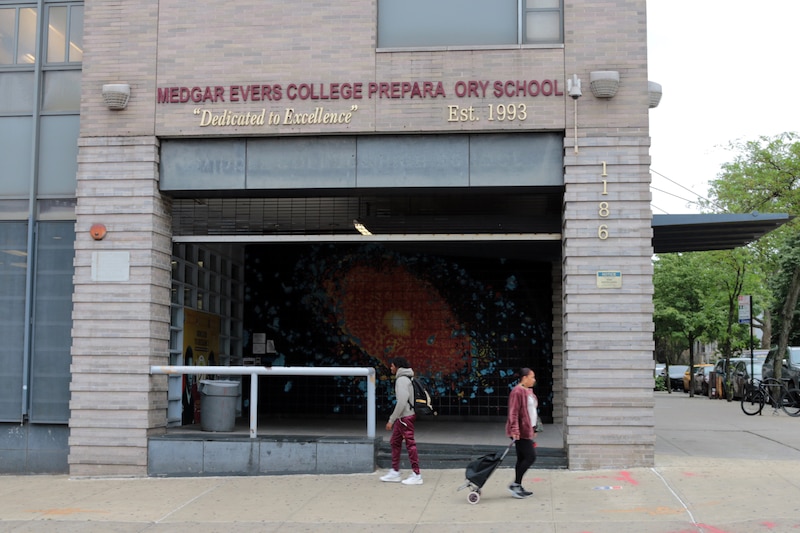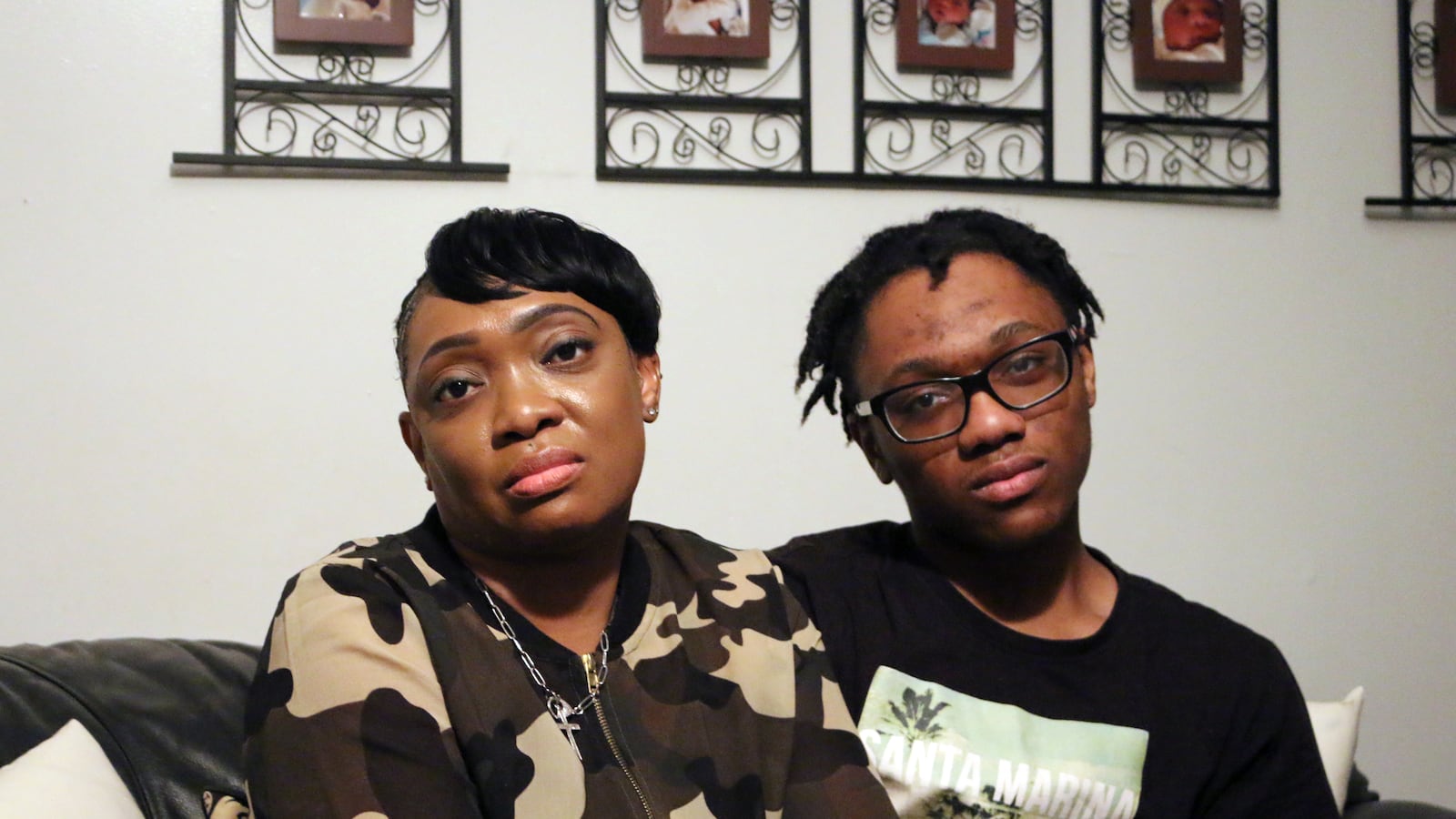Sign up for Chalkbeat New York’s free daily newsletter to get essential news about NYC’s public schools delivered to your inbox.
After trading taunts with a classmate one morning in March 2023, Tristan threw a punch that busted the other student’s lip. A teacher who intervened wound up with a bloody nose and swollen lip in the ensuing scuffle.
Then a ninth grader at Brooklyn’s Medgar Evers College Preparatory School, Tristan later took responsibility for starting the fight. “I hit him first — that’s where I was wrong,” said the teen, who requested his last name be withheld for privacy reasons.
School officials suspended Tristan for more than three weeks, among the longest punishments typically allowed under city guidelines. But while the case seemed open and shut, an impartial hearing officer later ruled that the lengthy suspension violated the teen’s rights.
Tristan, who has attention deficit hyperactivity disorder, or ADHD, received special education services to address impulse control and anger management. But the school failed to provide numerous counseling sessions that were supposed to help him learn to regulate his emotions, the hearing officer found.
During a legally required meeting to assess whether Tristan’s disability played a role in the fight, school staff did not consider his special education records, behavioral plan, or history of similar outbursts.
“There is no evidence that the [school’s review team] discussed any relevant documents,” wrote hearing officer Patricia Le Goff, who noted the school did not follow the required step-by-step process and Tristan’s mother was not allowed to offer her perspective. The hearing officer found that Tristan’s behavior stemmed from his disability and the school’s failure to provide counseling sessions.
Le Goff concluded that Tristan should not have received a lengthy punishment. But it was too late. Tristan had served his suspension.
New York City’s public schools routinely flout federal rules designed to prevent schools from removing children from class for long periods due to behavior related to their disabilities, a Chalkbeat investigation has found.
To examine the discipline process, Chalkbeat obtained hundreds of pages of special education records and rulings from impartial hearing officers who reviewed appeals from families whose children with disabilities received lengthy punishments. Those records — as well as interviews with more than a dozen parents, advocates, and school officials — reveal a pattern of schools failing to properly consider a student’s disability during the suspension process.
As a result, some students are serving longer punishments than legally allowed, a problem that disproportionately affects Black students. The removals can compound academic struggles among students who are often far behind their peers.
The problem stretches back years. Independent monitors who looked at nearly 1,400 suspensions between 2015 and 2018 found systemic flaws with the review process, according to a Chalkbeat analysis of findings that have not previously been made public.
“There are students who are being suspended weeks and weeks more than they should be,” said Andrew Gerst, an attorney who handled Tristan’s appeal while working at Mobilization for Justice, an organization that represents low-income families. “They should not be kept out of school one minute longer than they have to be.”
Students with disabilities are far more likely to be suspended compared with their nondisabled peers. As a group, they were removed from class 14,000 times last school year, about 39% of all removals and suspensions, despite representing 22% of the student body.
For long-term suspensions, which are less common and typically issued for significant misconduct, federal law requires an extra level of review. Schools must consider whether the behavior in question was related to a student’s disability or a failure to provide special education services guaranteed in their learning plan.
Trisha Clayton, Tristan’s mother, said the suspension review process left her feeling like the school wasn’t interested in supporting her son, and the lengthy punishment knocked him further off track. A different hearing officer later ordered the Education Department to pay for 900 hours of one-on-one tutoring in addition to other therapies to make up for inadequate special education support.
“He missed out on a lot of instructional hours,” Clayton said. “If you have a child with a learning disability or anger issues, they just don’t want to deal with those kinds of kids.”
Education Department officials said they could not comment on specific student cases, and the principal at Medgar Evers did not respond to questions.

School staffers on other campuses who have participated in suspension reviews said there are often good reasons to issue longer punishments, as they can help maintain a safe learning environment for other students and possibly deter future misconduct.
“Holding your teacher against the wall, or punching someone in the face, that’s not necessarily a manifestation of their disability most of the time,” said Anna Nelson, a former Bronx assistant principal who has participated in suspension reviews. “If a kid’s never been suspended before, it’s a message that really sticks with them.”
But advocates and parents say that schools often reflexively dismiss the possibility that a student’s disability played a role in their misconduct.
City education officials acknowledged in an interview with Chalkbeat that implementation of the suspension reviews can be uneven.
Over 600 Education Department staffers have been trained to make the reviews more collaborative, according to a department spokesperson, and officials have revised letters sent to families to better explain the process.
Stephanie Jemilo, a special projects director at the Education Department who oversees the training, said her team works with specific schools when they receive complaints from families. The goal is to make the meetings feel less punitive.
“It really is the process to say, ‘Hey, something‘s not working here, and let’s all come together and figure out what’s not working,’” she said.
Schools have long failed to account for students’ disabilities in the suspension process
All public schools are required to educate students with disabilities alongside their nondisabled peers to the greatest extent possible, a cornerstone of the federal Individuals with Disabilities Education Act. The law is designed to prevent schools from using the discipline process to exclude those students.
When a student is suspended for more than 10 days, or if there’s a pattern of short-term removals, school staff must determine if the behavior in question was “caused by or had a direct and substantial relationship” to the student’s disability or the school’s failure to provide mandated services.
If the answer to either is yes, the student is supposed to return to class immediately, and the school is required to conduct a behavior assessment. (There are some exceptions for extreme violence, drugs, or weapons possession.)
To make that decision, school officials must hold a meeting called a “manifestation determination review” within 10 days of the student’s removal from class. Schools must include parents and at least one staff member who knows the student, including a school psychologist or guidance counselor. Families are entitled to request others to join, such as a teacher who works with their child, and they can bring an advocate.
In theory, the process should be collaborative. But the final decision rests with the student’s school, an arrangement that families and advocates say is far from objective.
“It’s like somebody gets arrested and you go to the police station and ask them to have a hearing about whether they think that they were right to arrest the person,” Gerst said. “They have every incentive to stand by their decision.”
Problems with the city’s discipline process aren’t new, according to a Chalkbeat review of legal records and city data that has not previously been made public. A 2002 class action lawsuit filed by the nonprofit group Advocates for Children claimed schools routinely used discipline to exclude students without properly considering their disability.
After a protracted legal battle, the city settled the case in 2015 and agreed to some reforms. They beefed up training and created a mandatory checklist that spells out each step of the process schools must follow.
The city was also required to check whether schools were following the rules, sending independent monitors into nearly 1,400 suspension review meetings, a sample of the meetings held between 2015 and 2018. The monitors found glaring and systemic problems, according to reports obtained by Gerst through a public records request and shared with Chalkbeat.
For example, only 44% of suspension review meetings included “effective” discussion of the incident that led to the suspension and whether it was connected to disability-related behaviors, the monitors found during the 2017-18 school year. In 20% of cases that year, there was limited or no discussion of a student’s special education learning plan, raising questions about how the review team determined whether a student’s behavior was related to a lack of services.
Nicole Tuchinda, a professor at the Loyola University New Orleans College of Law who has written about the suspension review process, called those figures “disturbing” because they reveal schools frequently did not comply with key components of the law.
“It just shows it’s a sham,” Tuchinda said.
Failing to protect students with disabilities from longer punishments could further set back a group that is already disproportionately removed from their classrooms, are far behind their peers academically, and less likely to graduate on time.
One study focusing on New York City found suspensions led to students passing fewer classes, increasing their risk of dropping out, and lowering the odds of graduating. Other research also generally suggests that suspensions are linked to worse academic outcomes. Students who are suspended for more than five days are typically sent to alternate learning centers away from their school, an environment students say is often dull or chaotic.
Problems with the suspension review process are also more likely to affect students of color, mirroring broader trends in school discipline. Between September 2021 and December 2022, more than half of the 1,825 suspension reviews involved Black students, even though only a quarter of students with disabilities are Black, city data show.
Schools were more likely to find that white students’ behavior was related to their disability compared with their Black or Latino peers, according to figures obtained by Gerst.
Education Department officials declined to provide more recent figures and there is no federal data on the suspension review process.
The responsibility for ensuring the city is complying with federal special education laws falls to the state’s Education Department. State officials found some problems with the city’s suspension review process in 2023 that required “corrective action,” according to spokesperson JP O’Hare. He did not specify the nature of the problem or what specific action was required. The state Education Department has “not received any specific ongoing concerns” about the process, O’Hare added.
It is difficult to know how widespread problems with the review process are today: The Education Department stopped sending independent monitors to the meetings after they were no longer legally required.
Melinda Andra, a longtime advocate at the Legal Aid Society who has represented families in the suspension process, said there were some signs of improvement when the monitors were in place.
Now, she said, “Things have kind of backtracked.”
‘Everybody was just on the attack’: One family felt alienated by suspension review
Danet Ferguson’s son, Malachi, faced a monthlong suspension for fighting another student in January, striking two teachers who tried to break them up. She was confident the school would conclude the 13-year-old’s ADHD and oppositional defiance disorder contributed to the incident. The school found such a link in a previous suspension this school year.
In the aftermath of the fight, Malachi was removed from class at I.S. 181 in the Bronx. Ferguson, who runs a day care, was forced to drive him to a suspension center more than an hour away. “I’m stressed out and frustrated,” Ferguson said at the time. “His grades have dropped. … I’m missing work.”
A little over a week after Malachi was removed from class, his school held a suspension review meeting to assess if his disability played a role in the fight. Ferguson and Michaela Shuchman, her legal advocate, pointed to Malachi’s history of aggression and impulsivity, which are well documented in his special education records.

But school staff countered that Malachi’s behavior was premeditated. They said they could not let the incident slide without significant punishment, according to Shuchman, a lawyer at Bronx Legal Services.
“Everybody was just on the attack,” said Ferguson. “There was no one trying to listen.”
The school ruled Malachi’s disability wasn’t a major factor, allowing his suspension to continue. With Shuchman’s help, Ferguson appealed the case. A hearing officer found several procedural flaws with the school’s suspension review process.
Ferguson wanted Malachi’s counselor and one-on-one paraprofessional to attend the meeting, two people who could have helped interpret his behavior that day. But the school dismissed the request, arguing it came too late to ensure the staff could be there and wasn’t worth postponing the meeting, according to the hearing officer’s ruling.
Hearing officer Tanya White blasted the school for that decision, noting that Ferguson “had a right to designate attendees.” She added: “The two people that [Ferguson] requested would have provided a unique insight into the ultimate determination.”
It was also unclear whether the school was following Malachi’s special education learning plan, an issue that was not sufficiently discussed during the suspension review process, according to White’s ruling.
Malachi is supposed to have a full-time behavioral support aide, who had helped keep his behavior in check in the past, the hearing officer wrote. School staff claimed there was a different aide with Malachi at the time of the incident, though the hearing officer noted the aide’s presence was not included in the official incident report, nor did that person offer a witness statement or attend the suspension review meeting.
“The only two people who placed the covering paraprofessional at the scene are DOE staff members with a vested interest in the answer as to whether the Student’s [learning plan] was being implemented,” White wrote.
White was also troubled that the school had removed references to physical outbursts in Malachi’s behavior plan. Altering the behavior plan “undermines the DOE’s assertion that it arrived at the correct conclusion,” she wrote.
The principal of I.S. 181 did not respond to a request for comment. An Education Department spokesperson declined to comment on specific student cases and did not answer a question about whether the school’s staff have received training on the suspension process.
White ruled in Malachi’s favor, ordering the Education Department to pay for about 126 hours of one-on-one tutoring to make up for the disruption to his education. Malachi still served the monthlong suspension, which would have been nearly three weeks shorter if the school had found the fight was related to his disability at the initial review meeting.
Shuchman said overturning a suspension on appeal after the student has already served it is common, as that process often takes around 40 days to play out and most suspensions are capped at 20 days.
“It’s really justice delayed,” she said.
City officials resist calls for reform
Over the past year, advocates have pushed the Education Department to reform the discipline process but have struggled to gain traction.
A group of attorneys lobbied the Education Department to directly connect families to advocates before the suspension review meetings, as parents often don’t know their rights or how the process works. A handful of public interest legal groups offered to supply pro-bono advocates.
“Just having somebody in the room, just having your back … is really important to families,” said Gerst, one of the lawyers who supported the effort. “When we do advocate, we often find so many other special education issues.”
Some advocates and parents also suggested that school staff don’t review their own school’s suspension decision. The idea has some precedent: At charter schools, the suspension reviews are typically overseen by Education Department staff who don’t work for the school.
So far, the city has rejected the proposal to provide legal representation for families during the process, a decision Education Department officials declined to explain.
But they expressed some openness to taking the process out of the hands of the school that disciplined the student.
“It’s something that we are talking about,” said Jemilo, the Education Department official, “and exploring what an alternative could be.”
If the city made that change “that could be big,” Shuchman said, because the current process creates “a real conflict of interest.”
It is unclear how seriously city officials are considering it, however. An Education Department spokesperson declined to answer questions about who would conduct the reviews or a timeline for making that change.

In the meantime, advocates said the process is still stacked against families.
For Clayton, Tristan’s mother, the process was so overwhelming that she pulled him out of the city’s school system.
Even though Tristan won hundreds of hours of one-on-one tutoring, Clayton struggled to coax him to attend. The teen’s experience at school had reached a breaking point, and Tristan wound up getting suspended again, she said.
That was the final straw. “I was like, ‘I’m going to spend half the time at a suspension hearing,’” Clayton said.
So last September, Tristan moved in with his aunt upstate. His mother said he’s doing better in school, landed a job at a local bakery, and plans to go to trade school for plumbing.
The guidance counselor from Tristan’s old school recently called to ask after the teen.
Clayton was thrilled to offer an update.
“He’s really thriving,” she said. “I’m in disbelief.”
Alex Zimmerman is a reporter for Chalkbeat New York, covering NYC public schools. Contact Alex atazimmerman@chalkbeat.org.

